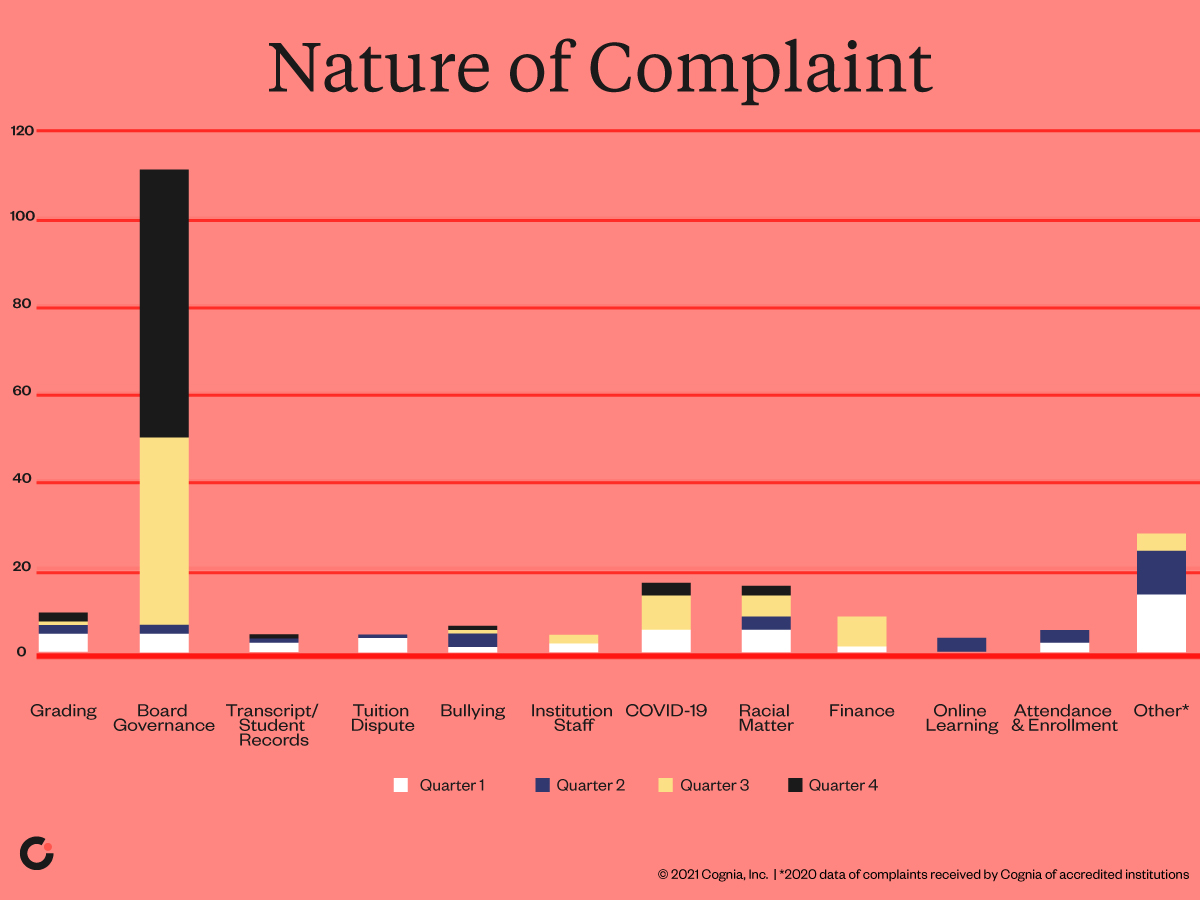Effective school boards are critical to the success of any school system—they set the vision, mission, and goals for the district; adopt policies that provide direction in support of meeting the districts goals, objectives, and strategic plan; adopt and oversee the district’s annual budget; and hire and evaluate the superintendent. Cognia helps school boards overcome challenges and advance school districts’ continuous improvement efforts.
Boards of education and superintendents that operate in a cohesive manner with respect, trust, transparency, and clear communication lead as a unified team that focuses on specific goals to reach their vision, mission, and beliefs of the system.
Effective school boards:
GreatSchools, 2009 |
But as anyone who has ever sat through a school board meeting can attest, not all relations among school board members or with the superintendent are cohesive or have transparent communication to create a sense of trust in the system.
Obstacles to effective board performance come from both directions: School boards often go far beyond the boundaries of their roles, stepping into day-to-day management; and superintendents often inhibit board members from playing crucial roles as partners in data monitoring and continuous improvement. Meanwhile, board meetings can run smoothly or seem unending and unnecessarily acrimonious, depending on how the board functions as a group.
Evaluating and Strengthening Board Performance
As part of its Accreditation Engagement Reviews, Cognia™ evaluates board operations. Expert peers who have held district leadership roles interview board members and investigate how the board is functioning. Reviewers typically ask a broad range of questions, such as:
- In what ways are you, the governing body, engaged in the school’s/institution’s continuous improvement efforts?
- How effective is your consensus-building process? Does the board stand together behind its decisions?
- Do you have any policies to monitor the school’s/institution’s short- and long-term continuous improvement plans? What is your role in ensuring these policies are implemented?
- How do you provide information to your stakeholders?
- What types of data are shared with the board about your school system’s performance, and how well do you think your school system is performing overall ?
- What programs have been successful for at least three years that the governing body had a role in approving and/or funding? Has the use of data become a common practice when making decisions as a governing body?
- How would you describe this school/institution to community members not affiliated with your system?
If requested, Cognia also provides in-depth, ongoing training to school boards and conducts special reviews to investigate complaints about everything from board infighting to allegations of racial discrimination in school discipline.
Most Common Complaints
The most common complaints that Cognia receives about governance occur when board members:
- Micromanage day-to-day operations of schools rather than review policy and procedures
- Lack norms of productive behavior, forget rules of order and collegiality and fail to work cohesively to promote student achievement and the district’s success
- Violate their own policies and codes of ethics by improperly promoting certain staff members for job openings in the district, getting involved in procurement decisions, or being unduly influenced by special interest groups or advisors
Ineffective school boards:
GreatSchools, 2009 |
Cognia data from engagement reviews from April to June 2021 indicate that school boards rate fairly well in developing policies and procedures and following a code of ethics in their deliberations and operations. Nonetheless, the largest number of complaints submitted to Cognia during the 2020–2021 school year are about school board governance. In fact, Cognia received more than 110 unsolicited complaints during 2020–21 on governance, almost the same number as those received on issues like Covid-19, grading, racial inequity, bullying, and school funding problems combined.

Benefits of Cognia Training
Most board members have good intentions and often make innocent mistakes based on lack of training in trusteeship and behavioral norms. There are more than 16,000 school boards in the United States, and not all have had recent training from their state school board association. Comprehensive training from Cognia brings boards up to date on state requirements, the proper roles and responsibilities of school boards and superintendents, Cognia standards for school governance, and Cognia data, classroom observation, and professional development tools. Training also addresses crucial areas such as group dynamics and consensus building, helping districts steer clear of governance problems before they happen.
Almost every issue can be avoided if board members understand their roles and responsibilities and follow a code of ethics that boards agree upon, sign, and collectively implement. Board members need training especially to build shared goals and develop skills in effective problem solving and to follow Robert’s Rules of Order to keep meetings focused and efficient.
Cognia has trained dozens of school boards and more than 260 board members over the last few years, resulting in better functioning boards in different regions of the United States. Many of the boards have called on Cognia to provide ongoing training to sustain continuous improvement and retrain the board as new members alter its composition.
Cognia provided training for Montgomery County, Alabama, Public Schools, a district that had undergone a state takeover, in part because of governance issues. Superintendent Ann Roy Moore was hired to lead the district during the takeover. “Cognia training helped ensure that people understood their roles and responsibility and set goals, and helped conduct a self-evaluation to identify what the weak spots were,” said Moore. “The training was a tremendous help so that everyone knew what they were supposed to do and we could also fix policies where needed.”
“Early on, Cognia conducted retreats with board members that also addressed interpersonal issues. We had to give a chance for everyone to let their feelings out about whatever was bothering them,” said Moore. As a result of the training, “the board and the superintendent are getting along with each other, and decisions are made on a rational basis. The board recognizes it has a lot to say when they get to vote on issue yes or no. And, generally speaking, we work out many of the issues before we bring them to the board.”
Cognia training helps school boards and governance teams build common understandings of what districts should accomplish and calibrate their expectations for school and district performance around the same high standards.
“For school boards and central office staff, the ability to prioritize students’ holistic needs and to understand what optimal performance looks like across all aspects of schooling are among the two most important aspects of leadership knowledge and ability,” said Dr. Terry Oatts, Superintendent of Rockdale County Public Schools in Georgia. “Cognia training afforded our board members and full governance team an inside look at Cognia’s new standards, which defines what constitutes high quality schooling. This training is essential for every school board member and superintendent, who should be very familiar with Cognia’s performance standards. These standards define excellence in establishing a healthy culture for learning; the responsibilities of leaders to influence and impact all aspects of schools in positive ways; and engagement for and growth in learning.”
The Board’s Role in Continuous Improvement
Leadership imbroglios and bad behavior are typically the most visible problems incurred by boards. But even well-run districts can have governance problems or develop a disconnect between board members and the central office if board members are not engaged in key issues beyond basic policies and budget matters or if they are left in the dark about continuous improvement efforts. In these circumstances, it is not uncommon for board members to become reactive, and stall needed action around improvement efforts when a problem arises.
Cognia defines continuous improvement as an embedded behavior within the culture of a school that constantly focuses on the conditions, processes, and practices that will improve teaching and learning. The school board’s role in continuous improvement includes:
- Knowing the data
- Writing good strategic plans
- Working effectively with the superintendent to promote student learning
- Monitoring priorities and asking questions about progress
- Advising stakeholders of continuous improvement policy
As part of board training, Cognia works to help boards understand the key elements of continuous improvement and the many data tools that can be used to determine progress. This training helps board members be comfortable using all kinds of school improvement data and know what to look for and what questions to ask to provide constructive oversight and strengthen decision-making.
From Efficiency to Results
In an earlier generation, school boards and school leaders were generally judged by the efficiency of the school system such as whether buses ran on time or lights came on for Friday night football games. But student results and continuous improvement gained new impetus after 2001 and the passage of the federal No Child Left Behind Act, which raised the stakes on school performance. School leaders could lose their positions, and schools could face rigid sanctions if they did not meet targets for annual yearly progress for all student subgroups.
Today, board members are accountable mostly for school and student success. This has required board members to be familiar with new types of data tools that have become increasingly sophisticated. Cognia has the ability to provide information that was never available before. Boards can see what is happening and how well teachers are engaging. They can review school and central office diagnostics about implementation of a reading program or teacher professional development. Boards no longer need to pay someone to make or monitor a strategic plan. All the information is available for a school board to determine what’s working, what’s not, and the hidden causes of problems in schools.
Increased Politicization
Another significant change has been the politicization of school boards that took hold with the development of public charter schools as an alternative to traditional public schools. That polarization has been further exacerbated during the COVID-19 pandemic as school boards face tough decisions, such as whether to open or close schools and whether students should be required to wear masks. Moreover, boards are asked to step in to determine strategies to provide racial justice remedies, some of which, though backed by evidence of student success, remain controversial.
In the wake of COVID, boards need to listen to the public and make difficult decisions. Boards need to agree to a clear process of decision-making, stick to it, and deliberate before public hearings. When a board makes decisions, they should be communicated as the unified voice of the system.
Advice for Board Members
- Work through the facts and discuss issues in a collegial manner.
- Seek public input, take all comments under consideration, and thank constituents for their feedback.
- Make decisions based on data.
- Maintain a current, workable strategic plan.
- Monitor and adjust the plan as necessary as required for continuous improvement cycles.
- Study how successful school districts operate.
You might be interested in From State Takeover to Turnaround
Reference
GreatSchools (2009, May 13). What makes a great school board member [Web log post]. Retrieved from https://www.greatschools.org/gk/articles/what-makes-a-great-school-board-member/
© Cognia Inc.
This article may be republished or reproduced in accordance with The Source Copyright Policy.
The information in this article is given to the reader with the understanding that neither the author nor Cognia is in engaged in rendering any legal or business advice to the user or general public. The views, thoughts, and opinions expressed in this article belong solely to the author(s), and do not necessarily reflect the official policy or position of Cognia, the author’s employer, organization, or other group or individual.

